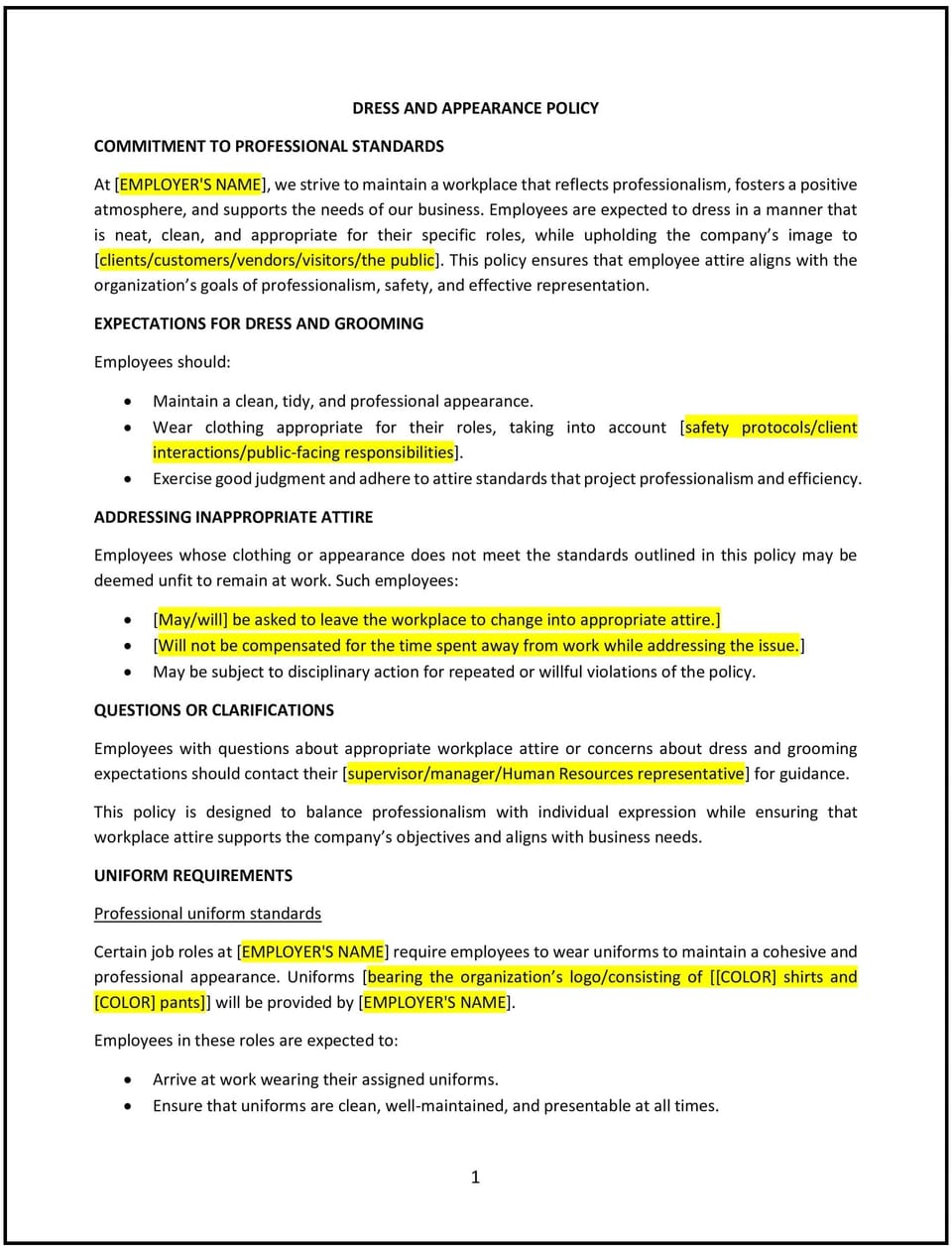Dress and appearance policy (Illinois): Free template

Dress and appearance policy (Illinois)
This dress and appearance policy is designed to help Illinois businesses maintain a professional, safe, and inclusive workplace. It outlines guidelines for employee attire and grooming standards while respecting personal expression and complying with Illinois laws, such as the Illinois Human Rights Act.
By adopting this policy, businesses can promote a positive work environment, enhance professionalism, and ensure safety and inclusivity.
How to use this dress and appearance policy (Illinois)
- Define dress code requirements: Specify the type of attire expected in the workplace, such as business professional, business casual, or uniforms, depending on the role or setting.
- Address personal expression: Allow reasonable accommodations for cultural, religious, or personal expression, such as hairstyles, religious head coverings, or tattoos, in compliance with Illinois law.
- Include safety considerations: Outline specific clothing or grooming requirements for roles involving safety risks, such as wearing protective gear or avoiding loose clothing near machinery.
- Prohibit inappropriate attire: Clarify unacceptable attire, such as clothing with offensive graphics, overly casual outfits, or items that violate safety or hygiene standards.
- Provide accommodations: Offer flexibility to employees who require adjustments to the dress code due to religious beliefs, disabilities, or other protected reasons.
- Establish enforcement procedures: Specify how the policy will be monitored and how violations will be addressed, emphasizing fairness and discretion.
- Ensure compliance: Regularly review the policy to ensure it aligns with Illinois laws and workplace practices.
Benefits of using this dress and appearance policy (Illinois)
This policy provides several benefits for Illinois businesses:
- Promotes professionalism: Ensures employees present themselves in a manner that reflects positively on the business.
- Enhances inclusivity: Respects cultural, religious, and personal expression while maintaining workplace standards.
- Supports safety: Reduces workplace risks by establishing clear guidelines for attire in safety-sensitive roles.
- Improves consistency: Provides a uniform approach to managing dress and appearance expectations.
- Aligns with laws: Complies with Illinois employment laws, reducing the risk of discrimination or legal disputes.
Tips for using this dress and appearance policy (Illinois)
- Communicate the policy: Share the policy with employees during onboarding and ensure it is included in employee handbooks.
- Train managers: Provide training to managers on implementing the policy fairly and accommodating employee needs.
- Encourage feedback: Allow employees to voice concerns or suggestions regarding dress code requirements to improve inclusivity and acceptance.
- Monitor compliance: Regularly assess adherence to the policy and address any concerns discreetly and respectfully.
- Update regularly: Revise the policy to reflect changes in Illinois laws, workplace practices, or employee preferences.
Q: What type of attire is expected under this policy?
A: The dress code varies depending on the role and workplace setting, such as business professional, business casual, or uniforms, as outlined in this policy.
Q: Are accommodations provided for religious or cultural attire?
A: Yes, accommodations are made for religious or cultural attire, such as hijabs, turbans, or other expressions, in compliance with Illinois law.
Q: How does the policy address safety concerns?
A: The policy includes guidelines for roles involving safety risks, such as wearing protective gear or avoiding loose clothing near machinery.
Q: What happens if an employee violates the dress code?
A: Dress code violations are addressed discreetly and fairly, with employees given an opportunity to correct the issue before further action is taken.
Q: Are tattoos or piercings allowed under this policy?
A: Tattoos and piercings are generally permitted, provided they do not display offensive content or interfere with workplace safety.
Q: How should employees request accommodations for dress code requirements?
A: Employees should submit accommodation requests to HR or their manager, explaining their needs and providing any necessary documentation.
Q: How often is this policy reviewed?
A: This policy is reviewed annually or whenever significant changes occur in Illinois laws, workplace practices, or employee feedback.
Q: Does this policy apply to remote employees?
A: Yes, remote employees are expected to adhere to appropriate dress standards for virtual meetings or other work-related interactions.
This article contains general legal information and does not contain legal advice. Cobrief is not a law firm or a substitute for an attorney or law firm. The law is complex and changes often. For legal advice, please ask a lawyer.


